MOANA NUI’S ENVIRONMENTAL MISSION :
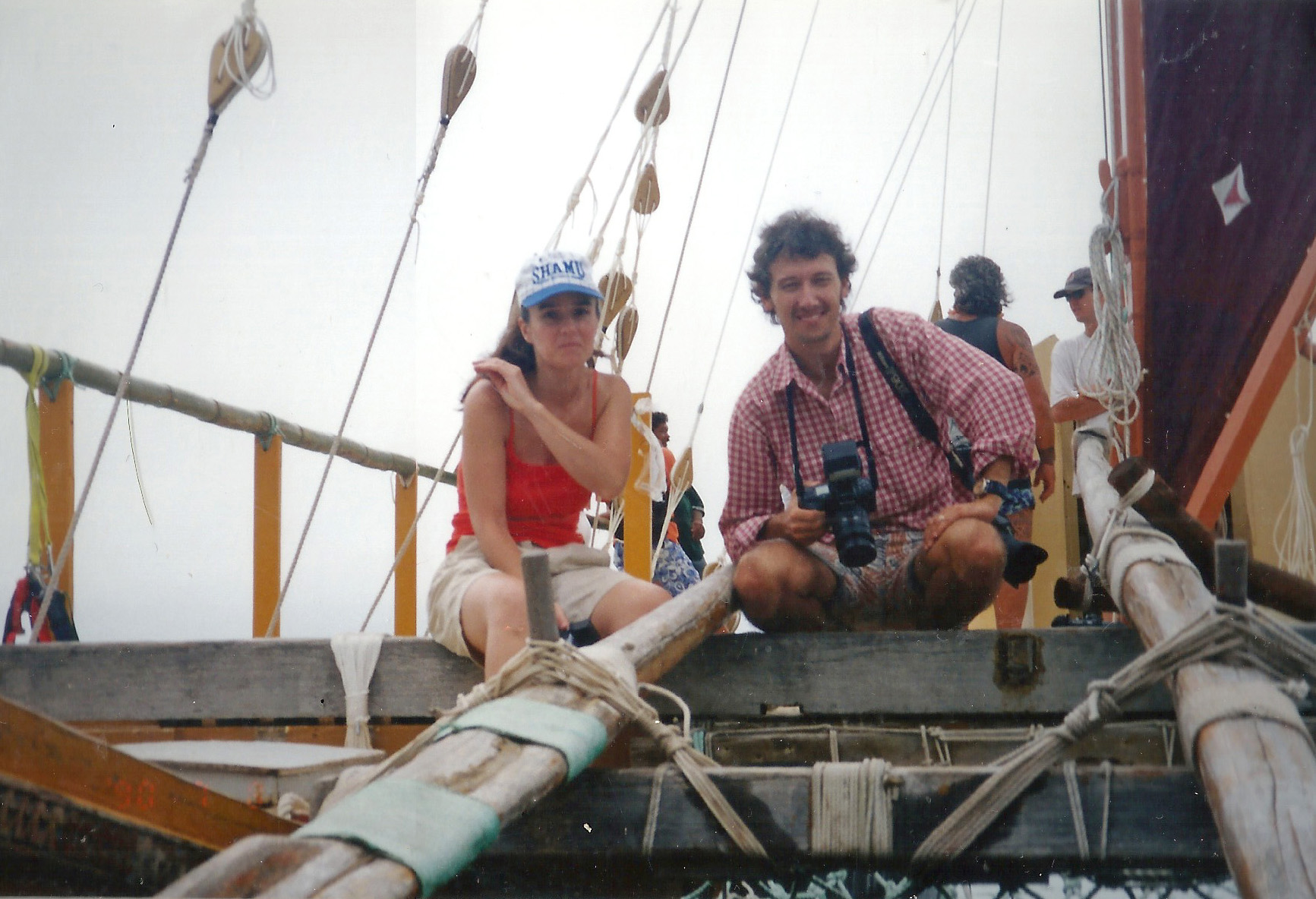
..
MOANA NUI PROJECT : THE ORIGIN
HAWAI’I 1999… I am on a photographic assignment on the tracks of the last Polynesian “Master-Navigators”.
Several months in the Pacific will have been necessary for me to really grasp the cultural wall which separates us, we, the “westerners”, from the people of the Pacific, from the peoples of MOANA NUI, the “Great Ocean”.
For our universe, mostly land-made, is just the “negative” of the mostly liquid universe of the Polynesians and Oceanians.
It is precisely this wide geographical and cultural gap between the two Western/Pacific planispheres that must be bridged…
But as soon as this glass ceiling was broken, I discovered not only an infinite human and cultural richness, but also knowledges which are several thousand years old, and which are able to bring solutions to our modern environmental challenges.
Back in France, I did a postgraduate degree in ethno-ecology on the theme of the revival of traditional navigation and its environmental challenges.
On a mission for UNESCO, then multiplying field surveys in French Polynesia, the Cook Islands, New Zealand and Hawaii, I deepened my knowledge of these ancestral know-how and wisdom of sustainable management of oceanic and island environments.
The many unfailing friendships I made there were a precious help in deciphering the subtlety of these concepts, “innovative” as well as holistic, of relationship with Nature.
The idea began to make its way : this diamond that I perceived through Polynesian navigation had just come out of its gangue.
The ancestral values and knowledges of the Pacific could help us save our oceans: the MOANA NUI project was born.
..
HOW WAS BORN THE FIRST “ECOLOGICAL TRANSITION” OF THE WORLD HISTORY
..
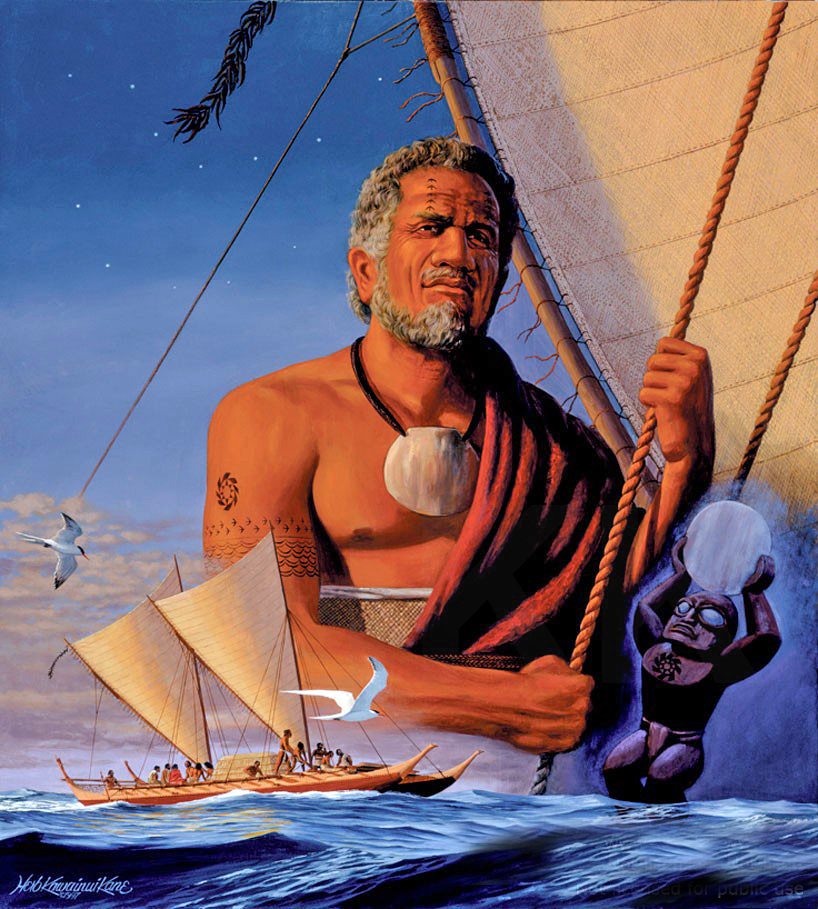 Painting of a Polynesian “Master Navigator”. These navigation experts were also true holders of ecological knowledge.
Painting of a Polynesian “Master Navigator”. These navigation experts were also true holders of ecological knowledge.
..
Peoples coming from Asia, between 50,000 and 1200 AD, explored and inhabited the Pacific in several waves.
This incredible feat of immemorial times was made possible thanks to traditional navigation techniques known to those who were called “Master Navigators”.
These Master Navigators, respected and adored, were able to travel thousands of miles across the open ocean, thanks to their intimate, almost symbiotic, knowledge of their ocean and island environment.
Stars, winds, currents, movements of bird life migration of marine mammals, observation of clouds and the level of salinity of the water were all clues that allowed them to orient themselves and reach their destination, sometimes a tiny island in the middle of the ocean.
However, fascinated by the blue immensity, by all the fertile land they always found before them, these peoples began to overexploit the ocean, to impoverish the islands, and to massacre maritime and island fauna.
As they moved further and further east, the land became scarcer and less fertile, while their populations grew.
Once they reached the Samoa/Fiji/Tonga area, the crisis became increasingly serious: the depletion of resources through environmental destruction led to social and economic tensions and wars.
On the verge of collapse, these Oceanic peoples made a major shift that we could now call ‘ecological’.
New ways of life were established, more respectful of the environment, and a new cosmogony emerged over the centuries, placing Man on an equal footing with the Nature that nourished him.
The Oceanians understood that the only way to perpetuate their life on an island was to find an economic mode that was in fact sustainable development, way before our modern times.
Christophe Sand – Director of the Archaeological Institute of New Caledonia and the Pacific
Member of the MOANA NUI Scientific Committee
Rahui and Tapu (fishing bans and “fallows” during certain periods or for certain species) were introduced, fishing and fish farming techniques were introduced to preserve stocks, and slash-and-burn cultivation was banned in favour of terrace cultivation.
Thanks to this new “sustainable” management, these peoples were able to maintain high population densities on small islands and become resilient in the event of natural disasters, such as cyclones or rising sea levels.
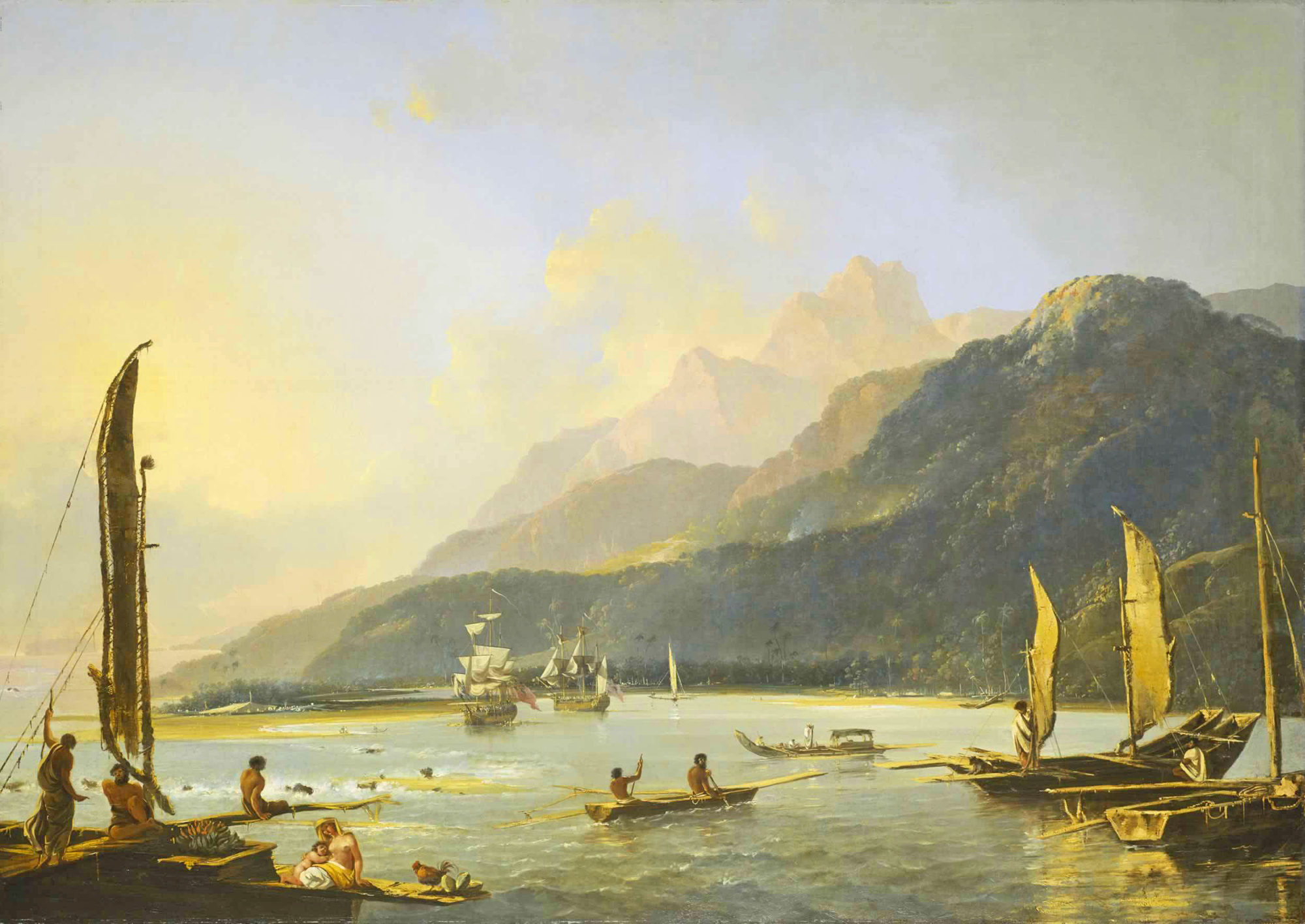
The first Western explorers arriving in Polynesia discovered a true Eden: people living in symbiosis with Nature.
Facing an inescapable collapse situation, the Oceanian and Polynesian peoples managed to create a resilience, which was a source of ecological, social and even technological progress: large canoes, ever more efficient, began to criss-cross MOANA NUI, the “Great Ocean”, the Pacific, to trade, exchange, and also spread good environmental management practices to the four corners of the Pacific.
Thus was born the very first “Sustainable Development”, the first “Ecological Transition” in the history of the world.
It brought social equilibrium and prosperity to these peoples, which was noticed by the first European explorers on their first voyages, encountering healthy, robust, cheerful and creative populations that had succeeded in creating a sustainable ocean empire.
..
THE KNOWLEDGES OF THE ANCIENT PEOPLES OF THE PACIFIC :
ORIGINAL AND PRAGMATIC ECOLOGY
The great advantage that the Pacific peoples had in implementing this ‘sustainable development’ from time immemorial was their intimate, multi-millennial and holistic knowledge of the marine, island and climatic cycles, ecosystems and elements of the world’s largest ocean.
This profound knowledge, which allowed them to navigate their trans-oceanic journeys without error, was the same knowledge that paved the way for a productive, resilient and sustainable co-existence with Nature.
This precise, complex knowledge formed a rich corpus of knowledges, pragmatic and effective.
Somewhat like the great VAKAs, which bore no resemblance to boats designed anywhere else in the world, the ancestral management techniques were based on unique concepts, sometimes far removed from our environmental management methods.
However, they had the same goal: optimise available resources to sustain large populations, ensuring their health, nutrition, well-being and environment.
.
.
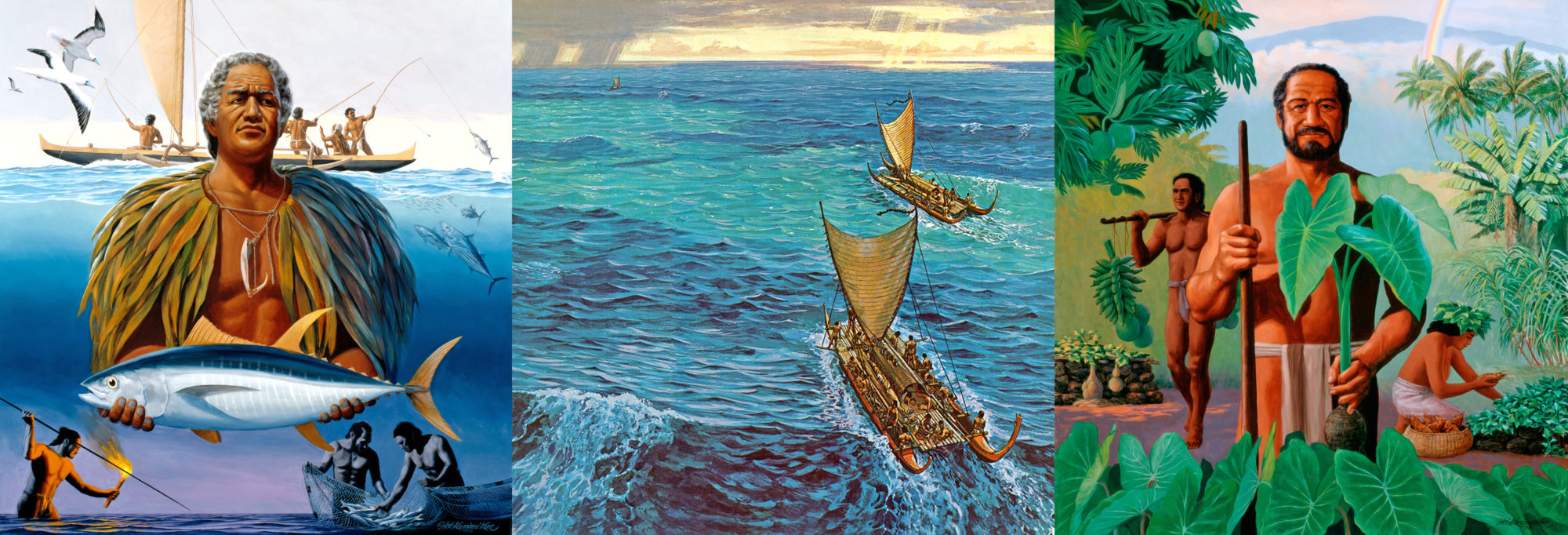
The Tahunas, bearers of ecological knowledges of managing ocean and island environments, spread their good practices throughout the Pacific thanks to the fleets of VAKAs, their large travelling canoes.
Yves Hénocque (IFREMER, Fondation de France), Aulani Wilhelm (CONSERVATION INTERNATIONAL, Hawaii), Cécile Gaspar (Te Mana O Te Moana), Sam Ohu Gon (THE CONSERVANCY OF HAWAII), Eve Isambourg (Sciences Po): on the environmental mission MOANA NUI.
MOANA NUI’S ENVIRONMENTAL MISSION :
FIND BACK THESE KNOWLEDGES
These complex knowledges have been passed down through the ages.
They are sometimes undermined by modern social and economic practices and organisations.
The last bearers of these knowledges also have a feeling of mistrust towards Western scientists, who they sometimes think will ‘steal’ their knowledge.
In addition, these traditional knowledge holders are becoming increasingly rare. Like the “Master Navigators”, the “Master Fishermen” and other “Tahuna” (knowledge holders) are disappearing…
MOANA NUI’s mission will be to find these precious knowledge bearers for our future, thanks to targeted field studies, combining biology/ecology and ethnology.
These thematic studies are currently being developed by our scientific council.
The concept of Ahupua’a – dividing the island and ocean into ‘management units’ from the summit to the near shore, Rahui and Tabu (fishing fallows), the use of endemic woods to stem rising seas, the deep understanding of biological cycles, reproduction, migration, site by site, species by species, and so many other original concepts will be found back during the MOANA NUI expedition.
 During the MOANA NUI Odyssey, scientists and traditional ecological knowledge holders will exchange and collaborate for better ocean management.
During the MOANA NUI Odyssey, scientists and traditional ecological knowledge holders will exchange and collaborate for better ocean management.
.
UPDATING THEM,
Once collected, these knowledges will be studied and tested on MOANA NUI “eco-sites”, potentially in New Caledonia, Fiji and French Polynesia.
This “test” period will be the opportunity to initiate a real collaboration between scientists and holders of traditional Pacific knowledges, the aim of which will be not only to define common “science/tradition” protocols, but also to remove any mutual distrust by bringing Western and Oceanian cultures together towards a common goal.
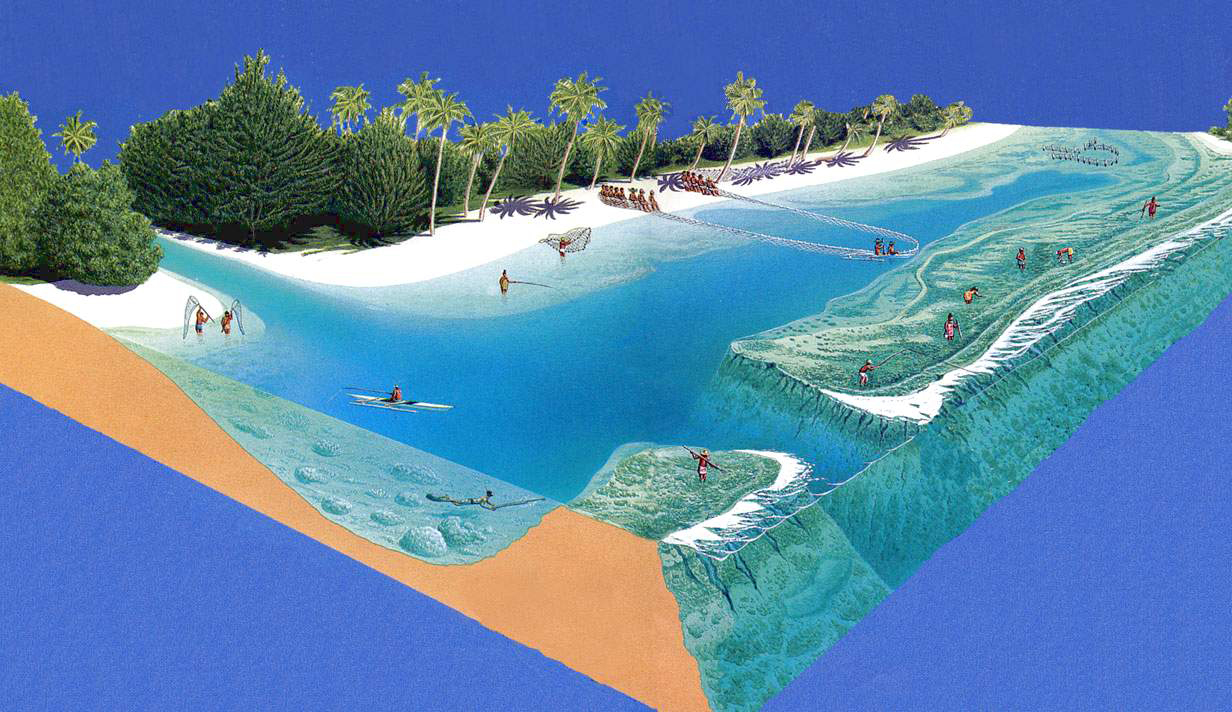 Sketch of the different types of resilient lagoon fisheries: their positive impact on the environment and stocks will be analysed and updated within the MOANA NUI eco-sites.
Sketch of the different types of resilient lagoon fisheries: their positive impact on the environment and stocks will be analysed and updated within the MOANA NUI eco-sites.
.
APPLYING THEM, in the heart of marine protected areas, whose management is sometimes complex and too dependent on non-local decisions, and whose future is sometimes called into question, including locally.
.
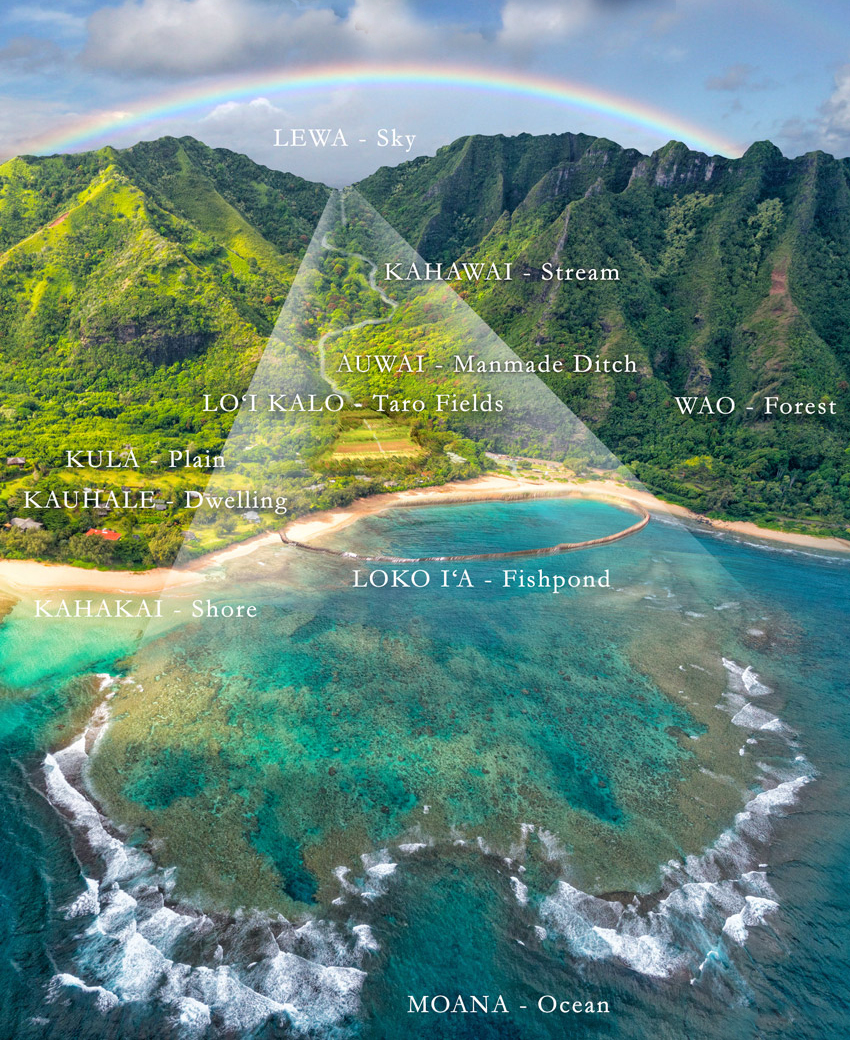 The traditional Polynesian concept of Ahupua’a is original and rich in lessons for the management of island, coastal and ocean areas. It takes into account the totality of the environmental management units divided into “slices of the cake” from upstream of an island to the open sea, with a view to sustainability and global coherence.
The traditional Polynesian concept of Ahupua’a is original and rich in lessons for the management of island, coastal and ocean areas. It takes into account the totality of the environmental management units divided into “slices of the cake” from upstream of an island to the open sea, with a view to sustainability and global coherence.
.
The science/tradition mix proposed by MOANA NUI will ensure a more sustainable management of these marine – and terrestrial – protected areas by relying on the best of ancestral ecological solutions, combined with the best of modern environmental science.
MOANA NUI will thus contribute to the proper management, sustainability and networking of these marine protected areas, on which our climate, our environment and our future rely.
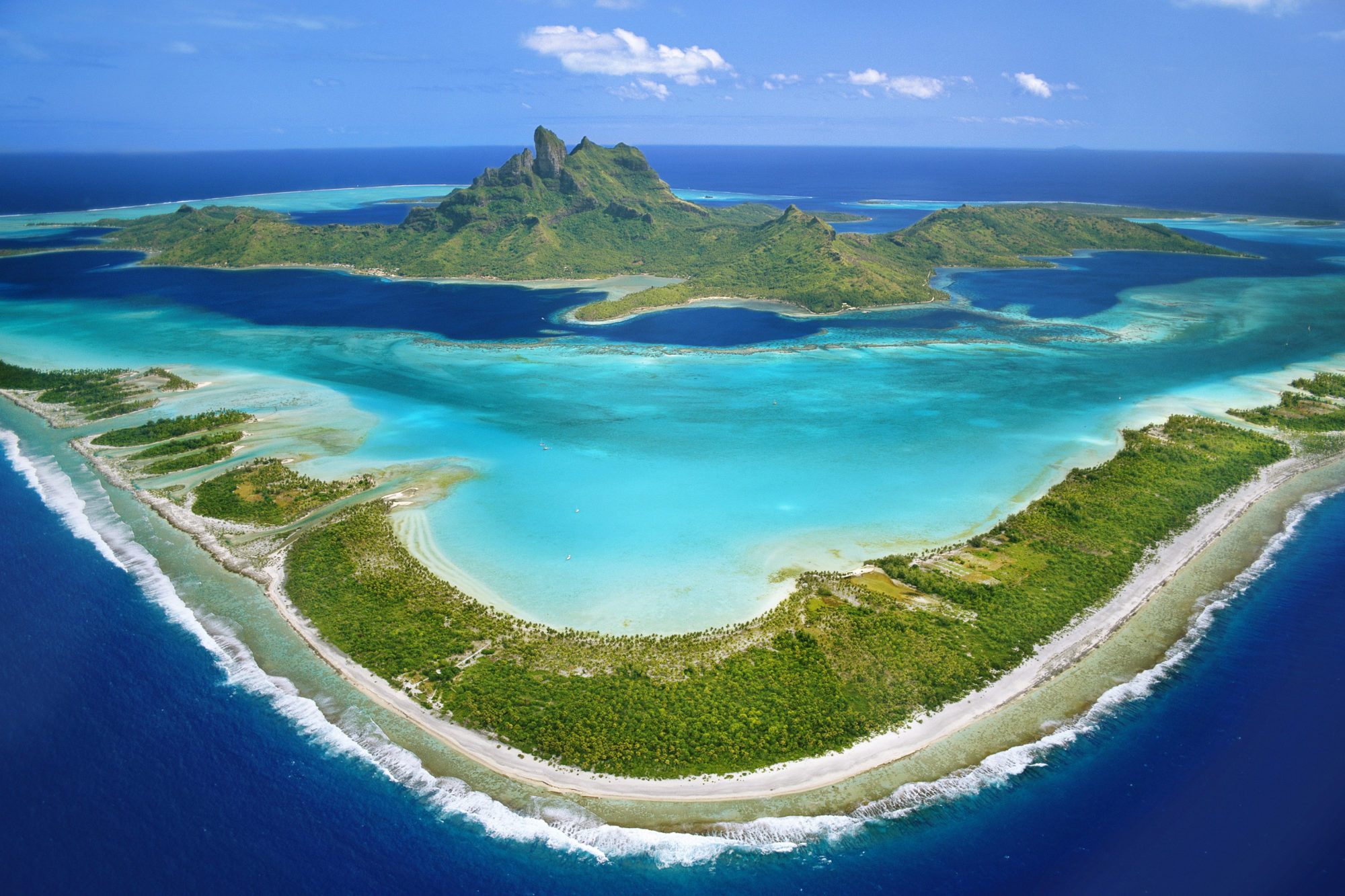
.
PUBLISIZE AND PROMOTE THEM
These management protocols, largely inspired by ancestral techniques, will be disseminated throughout the Pacific, then progressively in the rest of the oceans.
To do this, conferences and awareness-raising activities will be carried out throughout the Pacific – and then well beyond! – to disseminate these good practices, whose ambassadors will be our VAKA, symbols of ocean protection.
 Local workshops and international conferences will contribute to the dissemination of MOANA NUI’s original concepts of ocean protection.
Local workshops and international conferences will contribute to the dissemination of MOANA NUI’s original concepts of ocean protection.
Not to mention the various communication actions, or even a MOANA NUI foundation for the protection of the oceans, which could be envisioned.
This collaboration between science and tradition, which is technically, socially and economically indispensable, will enable us to put aside false good solutions and replace them with real good practices…
Christophe Mercier – founder of the MOANA NUI project
